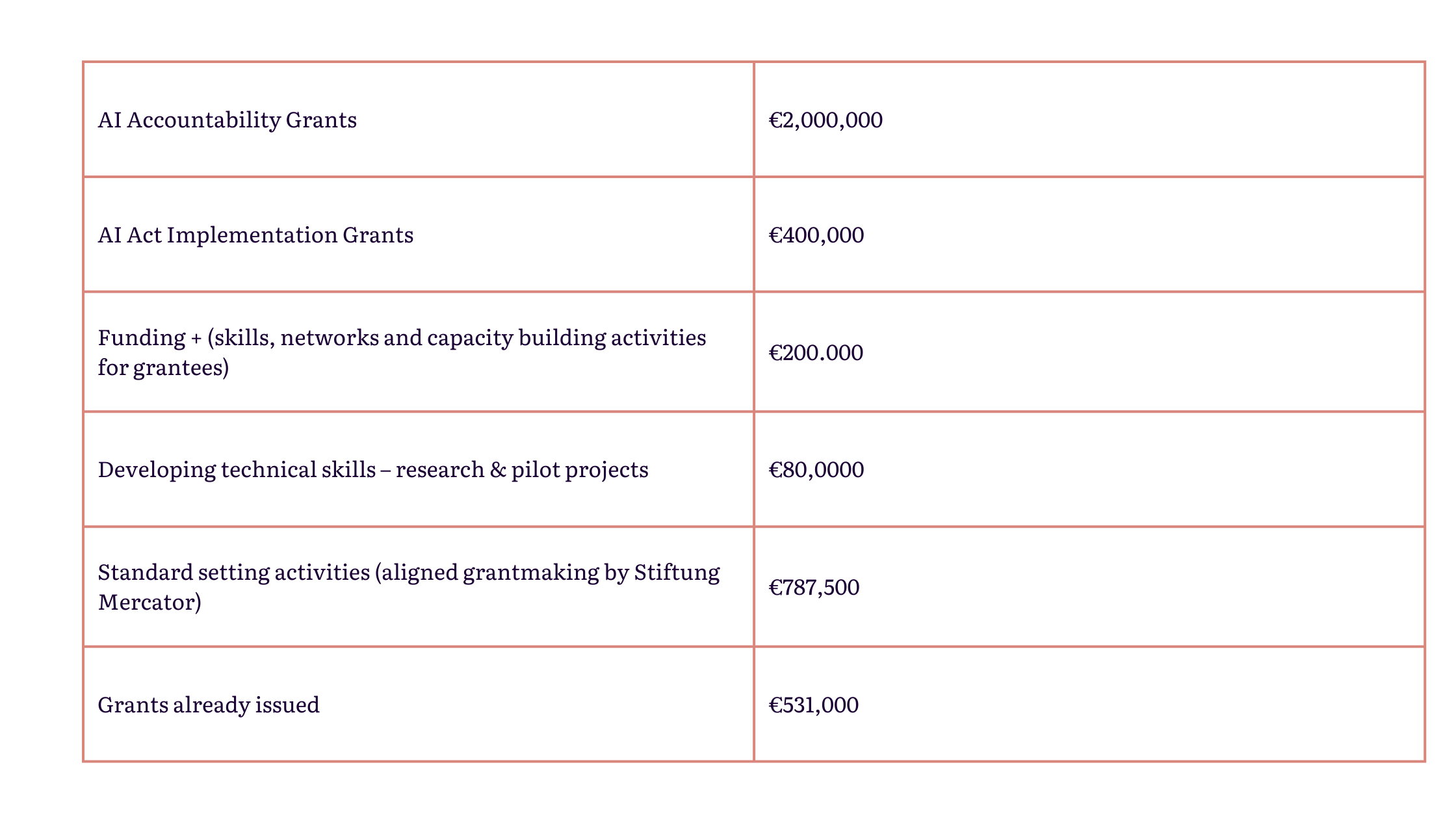Making Regulation Work: €4m commitment to challenge harms and secure accountability over the use of AI
By Director Catherine Miller

Over the past three years the European Union has developed a range of legislation, with the ambition of becoming the home for ‘trustworthy AI’. Many of the grantees in the European AI & Society Fund’s community played a strong role in shaping these policies. Now we want to focus on ensuring new and existing rules deliver accountability in practice. To do so, we’ve developed a new €4m grantmaking programme called Making Regulation Work. It’s the first of four strategic priorities that we’re working on under our new Breakthrough Initiative.
We have two funding calls open under the Making Regulation Work programme:
The AI Accountability Grants totalling €2m, offer funding of up to 200,000 for bold, adventurous project that explore how to hold those responsible to account for harms caused by the use of AI in Europe. Applications are open until 6 January 2025, 23:59 CET. Read more here.
The AI Act Implementation Grants totalling €400,000, offer funding of up to €60,000 to support immediate work to promote social justice objectives in the implementation of the European AI Act. Applications are accepted on a rolling basis. To be evaluated in the first funding round, apply before 10 November 2024, 23:59 CET. Read more here.
We want AI technologies to be built and used accountably, so they are of benefit to the public and in service of our shared democratic values. Regulation that is rooted in democratic processes and institutions allows societies – not tech companies – to set the terms for how technology should be used and creates a systemic foundation for preventing and challenging harms to people and society. While recognising that protections are often not universal (for instance, often excluding undocumented migrants) and the ability to exercise rights is bound up with privilege, good regulation can and should allow for innovation that is accountable to people’s needs to flourish side by side with an inclusive and sustainable society.
Recent AI developments have taken place in an environment where either regulation did not exist, was ill-matched to technology developments and business practices, or has simply been ignored by tech companies that want to ‘move fast and break things’. It’s resulted in a huge concentration of market power among the top five big tech companies, abusive use of AI in state surveillance systems, exacerbation of racial and gender injustice through biased systems, pollution of our information environment through AI generated content and algorithmic amplification and , degradation of the environment through consumption of vast energy resources among other challenges.
The European Union has now developed wide ranging tech regulation, including the Artificial Intelligence Act, the first global attempt to comprehensively regulate AI, the Digital Markets Act, aimed at addressing tech companies’ market power, and the Digital Services Act, which regulates platforms. Alongside Europe’s existing equalities, rights and consumer and worker protection legislation, these and other initiatives have created a new set of tools to challenge harms caused by the use of AI and set precedents for responsible innovation that benefits people and society.
Public interest advocates, including European AI & Society Fund grantees, achieved significant victories during the development of these laws, such as prohibitions on the most harmful uses of AI in the AI Act. But with powerful corporate lobbying and the realpolitik of European Union wrangling, the final legislation doubtless falls short in many aspects, for instance the AI Act allows companies to self-determine the degree of risk their products pose. Nonetheless this legislation presents a new opportunity to achieve some degree of new accountability over AI technologies. But only if the rules are enforced and implemented robustly.
The Making Regulation Work grantmaking programme will support work to make sure the hard work that our community has done to put the public interest at the heart of AI policy making leads to accountability and justice for harms experienced on the ground.
We don’t want to see another paper tiger, like the GDPR, where Europe develops laws in principle that are flagrantly breached in practice. That will only diminish confidence in democratic states’ authority and competence to shape the direction of AI and will strengthen industry’s hand in pushing back against regulation, in Europe and beyond. The Making Regulation Work grantmaking programme will support work to make sure that doesn’t happen and that the hard work that our community has done to put the public interest at the heart of AI policy making leads to accountability and justice for harms experienced on the ground.
Both the regulation that has been passed and the technology it hopes to govern are novel and we don’t yet know which mechanisms are most effective. Public interest advocates will need to come together to analyse and experiment with the new tools, demand redress for injustice and advocate for accountability where there are regulatory gaps, such as in policing and migration. The Making Regulation Work grantmaking programme will support the bold and experimental work that can build our collective understanding of this new landscape and chart a path for the public interest community and the funders that support them to direct their efforts in the longer term. As we do so, we will ensure that this work is driven by and delivering for the people who are most affected by the impacts of AI.
We are excited to get this work underway and grateful to our partners who have already committed more than €4m to the Breakthrough Initiative, enabling us to get money into the field rapidly to seize this opportunity. We’re starting with two grantmaking programmes: the AI Accountability Grants and the AI Act Implementation Grants.

An overview of the Making Regulation Work Programme Funding allocation.
Although it’s a big part of the picture, we know that regulation cannot deliver all the change we want to see. That’s why we’re also focusing on building a proactive agenda for AI that serves people and society. Our next priority under the Breakthrough Initiative will be the New Political Thinking grantmaking programme. If you’d like to share ideas for this, or any other part of our work, please feel free to get in touch.